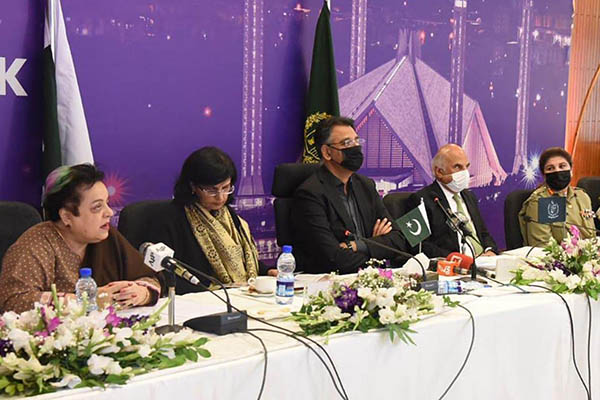
Photo courtesy PID
Planning minister says document provides ‘structured’ mechanism with clear objectives aimed at improving the lives of Pakistani women
The Planning Ministry on Tuesday marked International Women’s Day by launching a National Gender Policy Framework, with Minister Asad Umar saying it was aimed at a structured mechanism with clear objectives to improve the lives of Pakistani women.
Addressing a ceremony to launch the framework, Umar said it would provide equal opportunities to all segments of society, particularly women, to help them prosper and progress. “This framework converts that honest intent into an integrated actionable program,” he said, adding that women’s participation is “vital for the development of any society.”
Noting that a key problem the framework sought to tackle was low enrolment of girls in schools as compared to boys, he added: “The dropout rate [of girls] is increasing with each passing day.”
Stressing that the Planning Ministry was working on a mechanism to address shortcomings in the system, he claimed the criteria for performance appraisals in private organizations were often designed in a way that did not factor in the areas where women could perform better. “There are challenges like consensus building, helping people hone their skills, and the ability for conflict resolution where women generally excel more,” he said, adding that the government was also working on legislation to ensure gender equality. “If a person doesn’t feel protected then he/she cannot work to the best of their potential,” he said.
Umar also noted the need for women to be more politically active, saying basic changes were needed to the prevailing system for their empowerment. “When you devolve powers at the local level, it creates a balance and an opportunity for those who are not a part of the traditional power structure,” he said, claiming in the current scenario, women without political clout or influential families were unlikely to succeed.
The minister stressed that it was unfair to compare women’s challenges to that of men, noting women suffer more problems than men in Pakistani society.
In addition to Umar, the event was also attended by Inter-Provincial Coordination Minister Fehmida Mirza; Human Rights Minister Shireen Mazari; and Lt. Gen. Nigar Johar, the first-ever female general to be appointed the colonel commandant of the Army Medical Corps.
